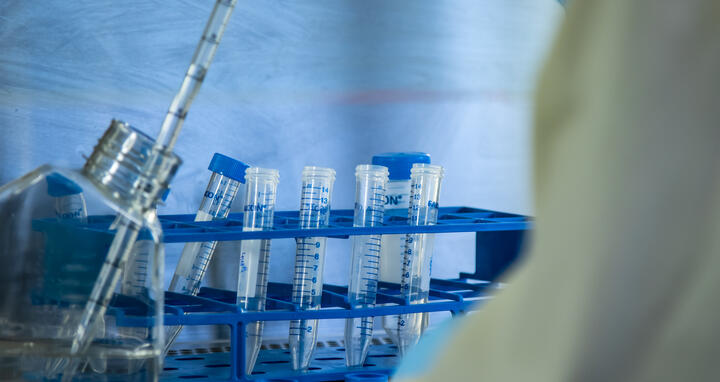Diet influences the course of multiple sclerosis
Gut bacteria function as an extra organ: They influence the immune system and the brain via their metabolites. The short-chain fatty acid propionic acid for example affects the intestine-mediated immune regulation in people with multiple sclerosis (MS). This has been demonstrated by a team from the Department of Neurology of Ruhr-Universität Bochum (RUB) at St. Josef Hospital, in an international study led by Professor Aiden Haghikia. The administration of propionic acid along with MS medication reduced the relapse rate and the risk of disability progression in the long term. In addition, initial magnetic resonance imaging studies indicated that propionic acid may reduce brain atrophy as a sign of neuronal cell death. The team recently published their results in the journal Cell. Also involved in the study were researchers from the Max Delbrück Center for Molecular Medicine in the Helmholtz Association (MDC) and from the Experimental and Clinical Research Center (ECRC).
Not only MS, but also many other diseases influence the bacterial colonization of the gut.
An independent organ within the gut
“Not only MS, but also many other diseases influence the bacterial colonization of the gut,” says Dr. Sofia Forslund, head of the Host-Microbiome Factors in Cardiovascular Disease Lab at the ECRC. Forslund and her team are studying how the gut microbiome develop in health and disease. Within the gut, the interaction between dietary components, microbiota, their metabolites, and the immune system takes place in the intestinal wall. “This is how gut bacteria can directly and indirectly affect anatomically distant structures such as the brain,” Haghikia explains. “The gut microbiome is accordingly an independent endocrine organ that interacts with its environment.”
Short-chain fatty acids can suppress inflammatory reactions
In the current study, the researchers successfully translated the results previously demonstrated in both cell cultures and in an experimental model to MS patients: short-chain fatty acids such as propionic acid (or its salt propionate) increased the number and function of regulatory T cells in the gut. “These cells stop excessive inflammatory reactions and reduce the number of autoimmune cells in autoimmune diseases like MS,” says Professor Ralf Gold, Director of the Department of Neurology at St. Josef Hospital.
At the MDC and the ECRC and at Martin Luther University Halle-Wittenberg, the researchers showed that the microbiome composition is altered in MS patients. “As part of an earlier collaboration with Aiden Haghikia, we had already established analytics for short fatty acids at the MDC’s Berlin Institute for Medical Systems Biology,” says Dr. Stefan Kempa, head of the Proteomics and Metabolomics Platform at the MDC. “Back then we did this out of pure curiosity.” In the current study, the researchers demonstrated a deficiency of propionic acid in the feces of MS patients, which was most pronounced in the earliest phases of the disease.
Gut bacteria and cellular power plants are of paramount importance
In collaboration with researchers from Bar-Ilan University in Israel, who had developed an intestinal model for the functional analysis of the microbiome, it emerged that propionate-associated changes of the gut microbiome play a crucial role in the differentiation of regulatory cells. The increased function of these cells was due to their improved energy utilization through an altered function of the mitochondria – the power plants of cells – as the research team demonstrated in collaboration with the Molecular Cell Biology research group at the RUB Faculty of Medicine.
The gut as a target for future therapeutic approaches
The short-chain fatty acids represent only a fraction of the metabolites of gut bacteria that are generated from the diet. “Further research into this largely unknown organ and the knowledge gained from it will enable us, going forward, to develop innovative dietary measures to complement the known therapeutics,” Haghikia says.
Text: Meike Drießen
The original version of this article was published by RUB on March 10, 2020.
Further information
Literature
Alexander Duscha et al. (2020): “Propionic acid shapes multiple sclerosis disease course by immunomodulatory mechanism”, Cell, 2020, DOI: 10.1016/j.cell.2020.02.035
Contacts
Dr. Stefan Kempa
Head of the Proteomics und Metabolomics Platform
Max Delbrück Center for Molecular Medicine in the Helmholtz Association (MDC)
stefan.kempa@mdc-berlin.de
Dr. Sofia Forslund
Experimental and Clinical Research Center
Head of the Host-Microbiome Factors in Cardiovascular Disease Lab
Sofia.Forslund@mdc-berlin.de
Professor Dominik N. Müller
Experimental and Clinical Research Center
Co-Head of the Hypertension-Mediated End-Organ Damage Lab
+49 30 450540286
dominik.mueller@mdc-berlin.de







